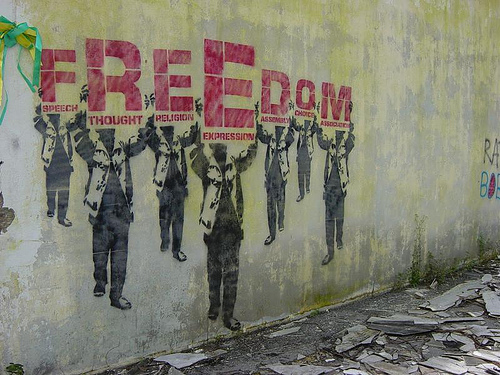
Many Christians engage in certain practices that seem possibly loose but claim they have the right due to “Christian liberty.” The verse that they are casually quoting comes from 1 Cor. 6:12 where Paul says: “All things are lawful for me.” But most people don’t finish his thought where he states that not all things are beneficial. He also states that he will not be mastered by anything. In Christ, we may have the “rights” to do certain things, but does it make it beneficial? And how do you know if you will be mastered by it or not? It comes down to certain issues. Can a Christian drink socially? What about intake of secular media? What type of speech should a Christian have?
For me, I resolved the issue in my mind by looking to a situation that Paul had to address a few chapters over from the previous verse. In 1 Corinthians 8, Paul was confronting the Corinthian church about a problem in their congregation. Some people were upset that people were eating meat that had been sacrificed and used in the worship of idols. Translation: this food had been used in worship to foreign gods, and then Christians were eating it. Paul said in 1 Cor. 8:4, “Therefore concerning the eating of things sacrificed to idols, we know that there is no such thing as an idol in the world, and that there is no God but one.“ So even if he did eat of that food, he knew that in his Christian liberty, he was in essence not doing anything wrong at all.
He then states in v. 9-13: “But take care that this liberty of yours does not somehow become a stumbling block to the weak. For if someone sees you, who has knowledge, dining in an idol’s temple, will not his conscience, if he is weak, be strengthened to eat things sacrificed to idols? For through your knowledge he who is weak is ruined, the brother for whose sake Christ died. And so, by sinning against the brethren and wounding their conscience when it is weak, you sin against Christ. Therefore, if food causes my brother to stumble, I will never eat meat again, so that I will not cause my brother to stumble.“
What is he saying? Paul is stating that he could in fact get away with eating that meat, but for the sake of those younger, more immature believers, he would not do it – even though he could. If he did partake, that action would actually turn into sinning against Christ (1 Cor. 8:12) because it is making his children stumble. So Paul’s resolution: I would never do anything that would cause my brother to stumble. Love limits freedom. He would rather do the loving thing for the sake of others than he would do the “free” thing for the sake of himself.
“All things are lawful, but not all things are profitable. All things are lawful, but not all things edify.” (1 Cor. 10:23). Edifying, building one another up in the Body, is one of the major reasons why we are still on this earth (Eph. 4:12)! In fact, Jesus actually said that if we caused someone to sin, it would be better for a stone to be wrapped around our neck and sink to the bottom of the sea (Matt. 18:6). You might have certain freedoms in Christ, but resolve never to make your freedom cause another to be enslaved.
Excerpt from Freshman 15.

Travis Agnew serves as the Lead Pastor of Rocky Creek Church in Greenville, SC. His most recent book is Just (About) Married.

Comments are closed.